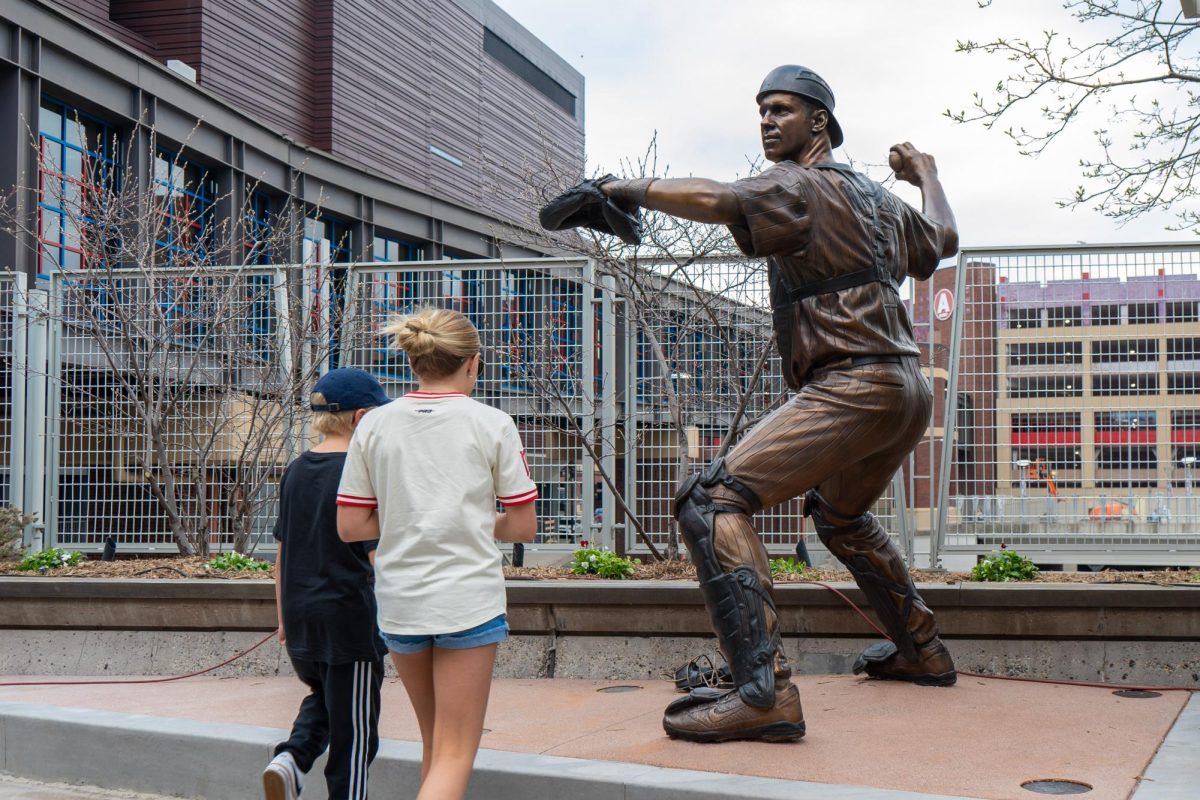Terry Steinbach walked into manager Tony La Russa’s office expecting to hear good news.
The Oakland Athletics catcher thought he was going to be praised for his excellent hitting. Instead, La Russa chewed him out for calling a poor game behind the plate.
“And if you ever call that crappy of a game again, we’re going to kick you out,” he recalled La Russa telling him.
“Your job is to handle this pitching staff that we have here. Hitting will come second. We’ve got guys who hit.”
Next spring, Steinbach will be called into his manager’s office for a different reason.
Steinbach was named the Minnesota Twins’ new bench coach and catching coach last month. Next year will mark his 14th year with the Twins but his first as the right-hand man to manager Ron Gardenhire.
The former Twins and Athletics player served 14 years in the big leagues, mostly behind the plate. He played in three World Series, was an All-Star Game Most Valuable Player and caught two no-hitters.
But it wasn’t all by design. Steinbach didn’t play catcher until he reached the big leagues. He was drafted as a third baseman out of the University of Minnesota in 1983.
Twins general manager Terry Ryan said Gardenhire recommended Steinbach for the bench coach position, which he’ll start next spring.
Steinbach said he’ll try to be critical and not agree with everything Gardenhire tells him. Steinbach said his biggest challenge will be getting to know modern-day players and getting back into the 162-game grind that makes up the season.
He will also have a chance to regain some of the competitiveness he experienced as a player.
“Winning is what it’s all about at this level,” Steinbach said.
‘Sandlot stuff’
Steinbach began playing baseball in his hometown of New Ulm, Minn., when his mom forced him, along with brothers Tim and Tom, out of the house in the summer.
“If you were near the house doing nothing, then you were going to get stuck doing chores,” he said. “So when we got out, we were gone.”
Steinbach called many of his childhood games “sandlot stuff” because balls often bounced off garages or rooftops.
“It was a blast,” he said. He said they made up the rules as they played.
Steinbach played park and recreation games along with travel leagues in New Ulm. Steinbach said he played a lot of infield positions. In high school, he said he played second base, third base and pitched.
Steinbach said he was highly recruited by Minnesota, Nebraska and Southern Illinois to play college baseball. He was also drafted by the Cleveland Indians in 1980 when he graduated from high school.
“At first it was quite an honor,” he said. But after considering the value of an education, he decided to follow his brother Tom’s footsteps and play for the Gophers.
The Gophers years
Steinbach was a two-time first team All-Big Ten selection with the Gophers. He was named the Big Ten tournament’s MVP in 1982 and won Big Ten Player of the Year in 1983.
He led the Gophers to a Big Ten title in 1982, their first under current head coach John Anderson.
George Thomas, head coach at Minnesota for the 1979-1981 seasons, said Steinbach arrived with the advanced skills and talent to play professionally.
“We didn’t have to tell him much,” Thomas said.
Thomas said Steinbach excelled as a third baseman, and he and his brothers complemented the middle of the lineup nicely each day.
“And [they] didn’t hold it over their head,” Thomas said. “They loved to play baseball.”
Because Steinbach had so much talent as a third baseman, he forced Greg Olson to move to catcher, Thomas said. Olson went on to catch for the Atlanta Braves and the Twins.
Anderson said Steinbach was a leader who cared about his team. His success on the field didn’t change him, and he always kept his eyes and ears open to learn something.
Thomas said his favorite memory of Steinbach came in a game against Oklahoma State. Tim Steinbach “ran over the catcher” in a close play at home and a fight ensued. Terry Steinbach was the first one out there to protect his team, Thomas said. Minnesota won the game, but perhaps more importantly, Thomas said, it showed that the team could compete with a powerhouse like Oklahoma State.
Anderson said he and Steinbach have kept in touch since he retired from baseball. The Gophers head coach said Steinbach hasn’t changed a bit since high school.
“He doesn’t have a big ego,” Anderson said. “He is approachable, just like your next door neighbor.”
Climbing the ranks
After the A’s drafted Steinbach in 1983, it didn’t take them long to see a conflict at third base.
“We just signed this guy named Mark McGwire, and we think he is going to play third someday,” Steinbach recalled being told. “We don’t think both of you guys are going to be there.”
So in 1985, the A’s sent Steinbach to Arizona to learn how to catch in an instructional league.
“It was ugly, but [I] got behind the plate, and they arranged to do drills and stuff,” he said of the league.
It didn’t take long for Steinbach to learn the position, though. He became the starting catcher for his Class AA squad in 1986, batting .325 with 24 home runs and 132 RBIs en route to being named the league’s MVP.
His performance resulted in a September call-up to the A’s against Cleveland. Steinbach said La Russa wasn’t afraid to play rookies who were performing well.
Steinbach entered the game as a defensive replacement in the seventh inning and homered in his first at-bat off a pitch from Greg Swindell.
He finished the season with five hits in 15 at-bats.
Small-town player on the big-league stage
Steinbach was the Opening Day catcher for Oakland by 1988 and was voted the starting catcher for the All-Star Game that year, even though his batting average at the break was below .220.
“Here you are with your idols and the best of the best, and you kind of have to pinch yourself,” he said.
Steinbach was voted All-Star Game MVP for driving in both runs in a 2-1 American League victory. He made the All-Star team three times in his career.
Oakland made the World Series three seasons in a row, winning it in 1989 against the San Francisco Giants. Steinbach was part of some of baseball’s most notable moments in the Fall Classic, including the earthquake that suspended Game 3 of the 1989 World Series for 10 days.
“Getting the chance to be a World Series champ is what every player works for,” Steinbach said. “While you’re going through it, you might not really realize how special it is. I think the longer that you play the game … you get more of a sense of appreciation.”
Steinbach played for the A’s through the 1996 season, which was his best statistically. A free agent after the season, he decided he wanted to come home to play for the Twins.
A big reason for the change was Steinbach’s family. He said he wanted his kids, who were approaching middle school age, to make friends and stay in one place for an extended period of time. It would also be easier on his wife, Mary, who would no longer have to worry about packing up belongings and moving around the country.
“Players have it easy. She had to be a mother and father at the same time,” Steinbach said. “She handled it well.”
Though the Twins struggled to win during Steinbach’s three seasons in Minnesota, Steinbach said he made a friend in Gardenhire, who at the time was the first base coach.
The two had met and talked when Oakland and Minnesota played each other previously. When they were finally in the same dugout, they continued to talk. Steinbach said Gardenhire asked about how to teach players to become better. Steinbach offered him advice on catching.
When Steinbach retired after the 1999 season, he continued playing baseball in a 35-and-older league with his two brothers.
He also traveled to the Twins’ spring training each year for about a week to work with the catchers and reiterate what he learned in Oakland’s system.
From the varsity field to Target Field
Steinbach also served as an assistant coach for the Wayzata High School baseball team for five years.
Head coach Bobby DeWitt said Steinbach was successful in taking what he learned as a professional and tailoring it to the mindset of a high school athlete.
“Players tune in to what he has to say,” DeWitt said. “His word is as good as gold.”
Now Steinbach says he’s excited for the chance to deliver those same messages to professional players.
“Everyone knows what someone is doing right or doing wrong,” he said. “The enjoyable part is finding out the best way to teach each person.”







